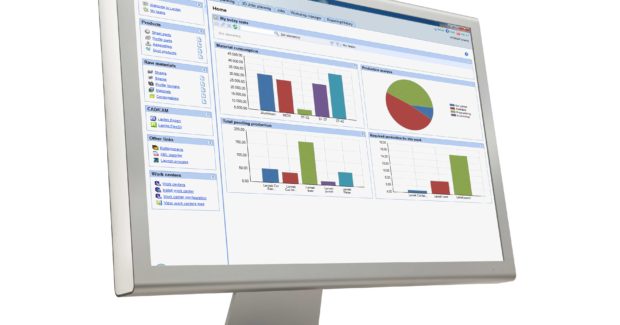Industry 4.0 for Sheet Metal Manufacturers
Factories in the future will be able to run automatically, for the most part. We are only at the start of this revolution, with a lot more development and integration to come, covering every aspect of a business and the performance of its machinery and resources.
Posted: December 22, 2016
Industry 4.0 is the next stage on from the automation systems that many manufacturers within the sheet metal industry are already embracing. We have supplied many CAD/CAM systems and we see that manufacturers understand the need for sheet handling systems, such as stacker systems for the automated loading of multiple sizes and specifications of material and the unloading, stacking and sorting of finished parts using automated handling systems such as chutes and robots. This type of equipment enables profiling and punching machines to operate without manual intervention, avoids wasted time on the machine for loading and unloading and frees up operators to do other tasks such as deburring and sorting while the machine is cutting.
With this type of automation, manufacturers are keeping their machines running for a much higher proportion of the time, maximizing return on investment. Additional benefits include flexibility of manufacture, making it possible to change between one job and another without lengthy setup times. Already within the CAD/CAM software we can nest and mix parts according to material thickness and type, reuse remnants, and link to MRP systems so that manufacture can accurately fit in with orders and delivery schedules.
The step to Industry 4.0 looks at the whole of a manufacturer’s business and incorporates intelligence and autonomous decision making into the mix to produce a Smart Factory. By creating a virtual model of the factory, which uses information fed back from the machines, processes and sensors and by making this available from almost any location by means of the Internet of Things (IoT), factories in the future will be able to run automatically, for the most part, only flagging up issues to managers when anomalies outside the automated decision making capabilities of the system are detected.
Clearly, this is a little way off reality at the moment, but with advanced technology suppliers are making big strides to make it happen. Their collaboration with machine tool manufacturers is a key part of this process. Where possible, they can already collect information from the machine tool about its status, which can then be fed back into their sheet metal MES system, automatically updating the manufacturing schedule and adjusting job times and costs and comparing them with the plan. The systems now being offered cover every type of machine and also extend into other processes, such as welding, painting and assembly with web systems that provide live feedback of manufacturing activity, specifically designed for fabrication plants.
Currently, automated decision making includes reordering of material and the creation of manufacturing orders to produce more parts when stock levels are low in inventory modules, while information fed back after each event goes to refine the system for future manufacturing to deliver increasingly accurate quotations, cost control and hence profits. Already, these inventory modules are fully web-based, making it possible to access data and reports via IoT for remotely located factories from cloud-based information. Tasks that require extensive processing, such as CAD/CAM, are currently an exception to this and, at the moment, are better handled locally.
A major factor driving Industry 4.0 is the increasing importance of the supply chain integrating customers and suppliers with high levels of transparency. Not only will this demand the delivery high levels of Overall Equipment Effectiveness (OEE), which will be made possible with the implementation of Industry 4.0 principles, but for those manufacturers that take up the challenge, it will engender loyalty and significantly higher value business from their customers.
We are seeing growing interest in the principles of Industry 4.0 as manufacturers appreciate the benefits that this technology can deliver for their whole business. At the moment we are only at the start of this revolution, with a lot more development and integration to come, covering every aspect of a business and the performance of its machinery and resources. As part of this process, technology suppliers are now partnering with world-leading manufacturers, which will eventually result in the most advanced sheet metal production facilities ever constructed.


















